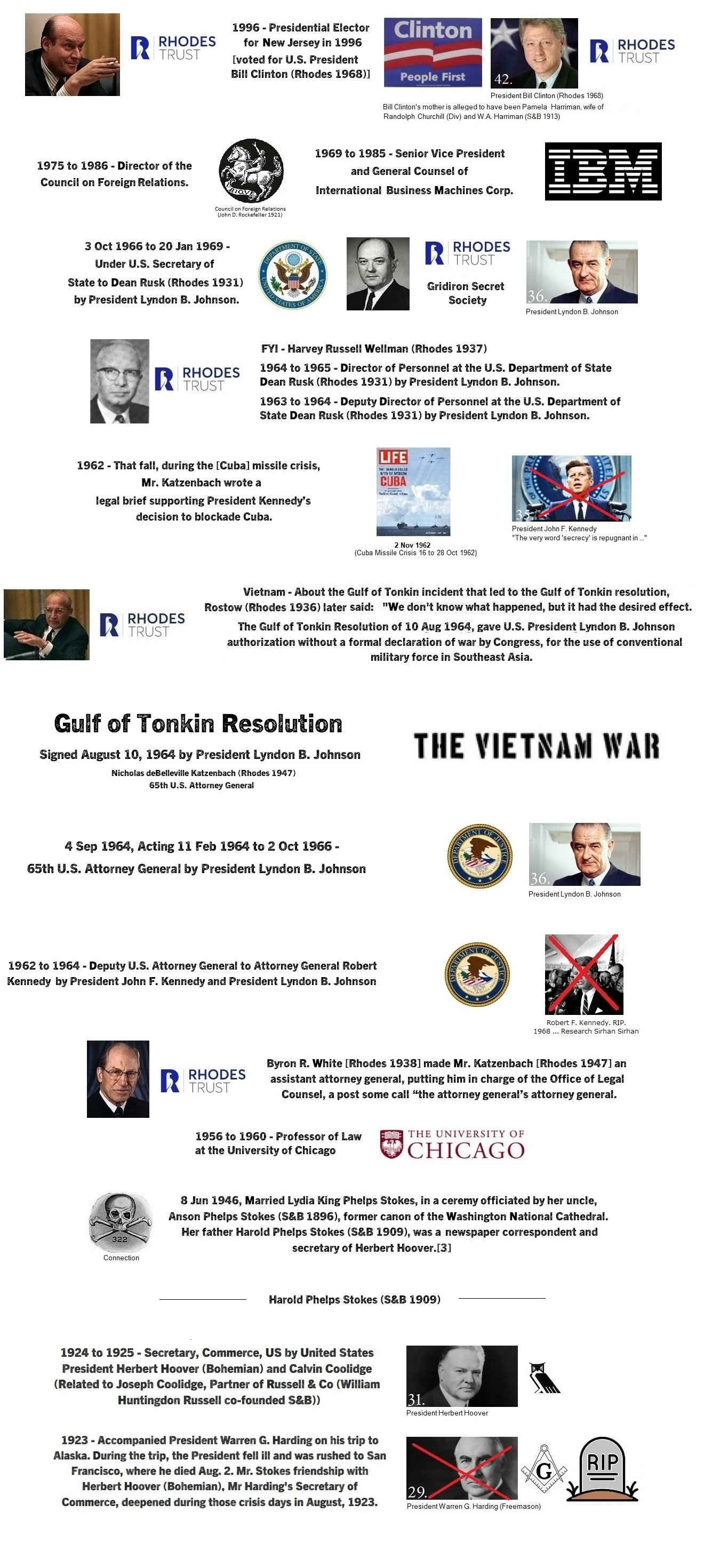
Nicholas deBelleville Katzenbach (Rhodes 1947)
Democratic. Lawyer. Phillips Exter Academy*[3]. Princeton University. Yale University. Rhodes Scholar, Balliol College, University of Oxford. Counci on Foreign Relations.
1996 - Presidential Elector for New Jersey in 1996 [voted for U.S. President Bill Clinton (Rhodes 1968)]
1991 - Named - Served as chairman of the troubled Bank of Credit Commerce International.[3]
1986 - Joined private practice at the New Jersey-based firm of Riker, Danzig, Scherer Hyland & Perretti.[3]
1975 to 1986 - Director of the Council on Foreign Relations.
Three days before Nixon took office, the Johnson administration filed an antitrust suit against I.B.M., seeking to break it up. I.B.M. admitted it was a monopoly but argued that its actions were legal and did not suppress competition. Mr. Katzenbach represented the firm in a 13-year war of attrition, including a trial of more than six years. In the end, the administration of President Ronald Reagan dropped the case, in 1982, saying it was without merit.[3]
1969 to 1985 - Senior Vice President and General Counsel of International Business Machines Corp. [IBM]. After Richard M. Nixon, a Republican, was elected president in 1968, Mr. Katzenbach resigned from the State Department and joined I.B.M. as senior vice president and general counsel. He soon found himself in the role of adversary of the federal government.[3]
In 1968 Nicholas de B. Katzenbach (Rhodes 1947), Assistant Secretary of State, made a statement that was similarly inconsistent with observable fact, and displayed a fundamental lack of common-sense reasoning:
“We should have no illusions. If we do not sell peaceful goods to the nations of Eastern Europe, others will. If we erect barriers to our trade with Eastern Europe, we will lose tile trade and Eastern Europe will buy elsewhere. But we will not make any easier our task of stopping aggression in Vietnam nor in building security for the United States.” [House of Representatives, To Amend the Export-Import Bank Act of 1945 (Washington, 1968), p. 64.][4,p35]
3 Oct 1966 to 20 Jan 1969 - Under U.S. Secretary of State to Dean Rusk (Rhodes 1931) by President Lyndon B. Johnson.
Preceded by George Ball (Lend-Lease / Bilderberg). Succeeded by Elliot Richardson (Freemason)
4 Sep 1964, Acting 11 Feb 1964 to 2 Oct 1966 - 65th U.S. Attorney General by President Lyndon B. Johnson
Preceded by Robert Kennedy (Died 6 Jun 1968). Succeeded by Ramsey Clark.
25 Nov 1962, three days afterward, he sent a memo to the presidential aide Bill Moyers proposing that an independent national commission be established to investigate the killing. The memo, released by the National Archives in 1994, began, “The public must be satisfied that Oswald was the assassin; that he did not have confederates who are still at large; and that the evidence was such that he would have been convicted at a trial.” Four days later, Johnson appointed the Warren Commission to investigate the killing; it concluded that Oswald had acted alone. Conspiracy buffs have interpreted the Katzenbach memo as calling for such a panel to come to a predetermined conclusion. But Mr. Katzenbach maintained that he was simply convinced that Lee Harvey Oswald was the lone assassin.[3]
1962 - That fall, during the [Cuba] missile crisis, Mr. Katzenbach [Rhodes 1947] wrote a legal brief supporting President Kennedy’s decision to blockade Cuba.[3]
March 1962 - After Mr. White was named to the Supreme Court in March 1962, Mr. Katzenbach [Rhodes 1947] replaced him as Robert Kennedy’s deputy. That September, in the face of riots, he was sent to the University of Mississippi to enforce a federal court order requiring the university to admit its first black student, James Meredith. “If things get rough, don’t worry about yourself,” Robert Kennedy told him jokingly, according to Arthur M. Schlesinger Jr. in “Robert Kennedy and His Times.” “The president needs a moral issue.”[3]
1962 to 1964 - Deputy U.S. Attorney General by President John F. Kennedy and President Lyndon B. Johnson.
One friend was Byron R. White [Rhodes 1938], the newly appointed deputy attorney general under Robert Kennedy. Mr. White [Rhodes 1938] made Mr. Katzenbach [Rhodes 1947] an assistant attorney general, putting him in charge of the Office of Legal Counsel, a post some call “the attorney general’s attorney general.”
Preceded by Byron White (Rhodes 1938). Succeeded by Ramsey Clark (Delta Tau Delta)
1956 to 1960 - Professor of Law at the University of Chicago
8 Jun 1946, Married Lydia King Phelps Stokes, in a ceremy officiated by her uncle, Anson Phelps Stokes (S&B 1896), former canon of the Washington National Cathedral. Her father Harold Phelps Stokes (S&B 1909), was a newspaper correspondent and secretary of President Herbert Hoover (Bohemian).[3]
WW2 - United States Air Corps.
Died 8 May 2012, from Not Known. Age 90.
Mother … was a member of the New Jersey State Board of Education for 44 years and its President for a decade.[3]
[2] - FYI - Wiki - Nicholas deBelleville Katzenbach (Rhodes 1947)
[4] - National Suicide. Military Aid to the Soviet Union by Professor Antony C. Sutton (1973)



Comments